Best Tools For Startups
Starting a business is both exciting and challenging. Utilizing the right tools can significantly streamline operations and foster growth.
From project management and communication to marketing and finance, the best tools for startups enhance productivity, facilitate collaboration, and drive efficiency. These tools help startups stay competitive, manage resources effectively, and scale operations with ease.
Here, we explore essential tools that can give your startup a strong foundation for success.
Why Are Tools Essential for Startups?
Tools are essential for startups because they significantly enhance efficiency, scalability, collaboration, and resource management. By automating repetitive tasks, tools free up valuable time, allowing team members to focus on strategic and creative activities crucial for growth.
They streamline processes through project management software, ensuring tasks are organized and completed on time.
Scalability is another critical aspect, as tools like CRM systems manage customer interactions and data efficiently, supporting business expansion without compromising service quality. Additionally, collaboration tools facilitate seamless communication and teamwork, essential for startups with limited resources and remote teams.
AI transcription tool solutions further enhance communication by providing accurate and quick transcriptions, aiding in efficient documentation and information retrieval. Finally, robust analytics and financial tools provide startups with the insights needed to make informed decisions, optimize operations, and ensure sustainable growth.
Best Tools for Startups in 2024
Here are 20 of the best tools for startups in 2024, providing detailed descriptions across various domains such as project management, marketing, finance, and customer relationship management:
For Project Management & Collaboration
1. Trello

Trello has earned its reputation as one of the top project management tools for startups, but its appeal extends far beyond new businesses. Established companies like Adobe, Pinterest, and Kickstarter rely on Trello to enhance collaboration and productivity within their teams.
This intuitive platform simplifies task management by organizing projects into boards, lists, and cards. With features like customizable workflows, task assignment, and deadline tracking, Trello empowers teams to stay organized and focused on their goals.
Features:
a) Create visual boards to represent projects, workflows, or processes for better organization.
b) Break down projects into manageable tasks by organizing them into customizable lists.
c) Assign tasks, add descriptions, attach files, and set due dates to individual cards for clear accountability.
d) Seamlessly integrate with a variety of third-party apps and services to enhance productivity.
e) Foster teamwork by enabling team members to comment, share feedback, and collaborate in real-time.
Simplicity, flexibility, and collaborative features make it an indispensable tool for startups looking to streamline project management, boost team productivity, and achieve their business objectives efficiently.
2. Asana
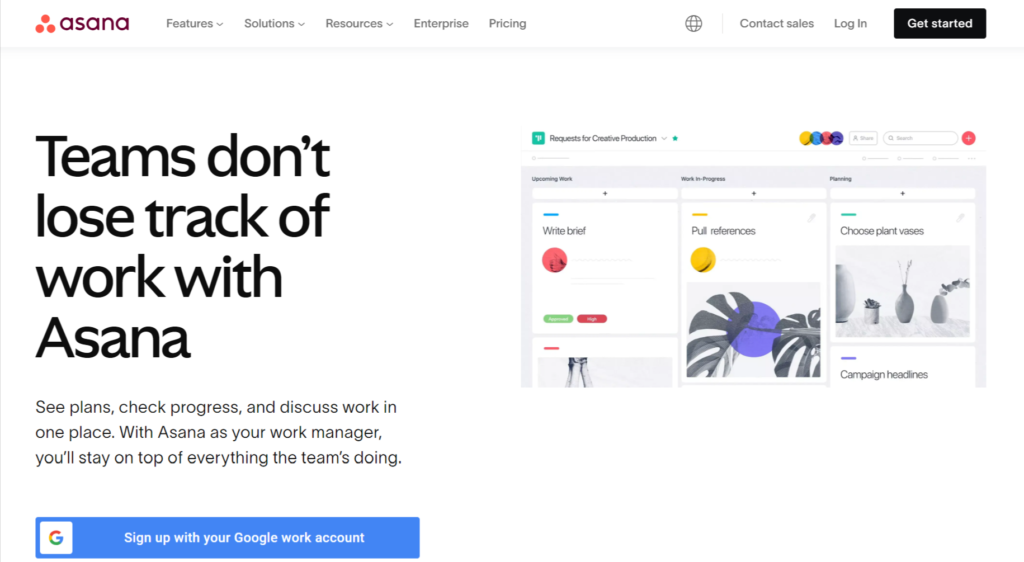
Asana stands out as one of the premier project management platforms, not only favored by startups but also embraced by industry giants such as Uber, Google, and Facebook. Its widespread adoption among diverse businesses underscores its effectiveness in enhancing organizational efficiency and project coordination.
This versatile tool excels in task management, enabling teams to organize, track progress, and meet deadlines effectively. With features like customizable workflows, intuitive timeline views, and workload management, Asana empowers teams to streamline their processes and collaborate seamlessly.
Features:
a) Design custom workflows tailored to your team's unique needs and project requirements.
b) Visualize project timelines and dependencies to better plan and allocate resources.
c) Balance team members' workloads and optimize resource allocation for maximum efficiency.
d) Repetitive tasks and streamline workflows to save time and increase productivity.
e) Gain valuable insights into project performance and team productivity through comprehensive reporting and analytics.
f) Scalability makes it an indispensable tool for startups seeking to manage projects effectively, drive innovation, and achieve their business objectives with confidence.
3. Kohezion
Kohezion is a versatile project management tool that streamlines project lifecycles. From planning and task management to collaboration and content storage, Kohezion empowers your team. Visualize project progress, assign tasks, collaborate seamlessly, manage content, and track budgets—all within a unified platform. Whether you’re handling software development, construction projects, or research initiatives, Kohezion ensures efficiency and success.
Features:
a) Task Management: Assign tasks to team members, set deadlines, and monitor task completion.
b) Collaboration Tools: Facilitate communication via chat, discussion boards, file sharing, and real-time collaboration.
c) Content Management: Create, store, and manage marketing content.
d) Budget and Expense Tracking: Manage marketing budgets, track expenses, and generate financial reports.
e) Automation: Kohezion automates repetitive tasks, saving time and reducing manual effort. Set up triggers, notifications, and workflows to keep your projects on track.
4. Slack
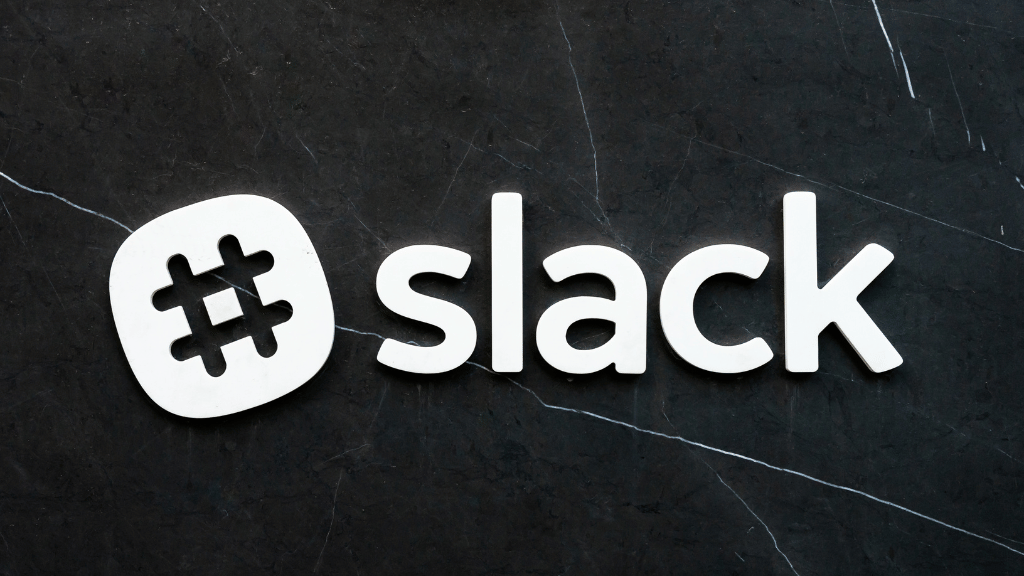
Slack is not just a go-to communication tool for startups; it has also become a staple for major corporations like Airbnb, IBM, and Target. Its popularity stems from its ability to revolutionize team collaboration, making it more efficient and engaging.
This platform serves as a centralized hub for communication, offering real-time messaging, file sharing, and integrations with countless other productivity tools. By fostering transparent communication and reducing email clutter, Slack accelerates decision-making and problem-solving within teams of any size.
Features:
a) Organize conversations by topics, projects, or teams to keep discussions focused and accessible.
b) Instantly communicates with individuals or groups through direct messages or group chats.
c) Share documents, images, and videos seamlessly within conversations.
d) Connect with a wide range of third-party apps like Google Drive, Trello, and Zoom for enhanced productivity.
e) Quickly find past messages, files, and discussions using powerful search functionality.
f) Extensive customization options and robust security measures make it an indispensable tool for startups seeking to foster collaboration, boost productivity, and drive innovation within their teams.
5. Venturz

Venturz is an all-in-one platform tailored for startups, specifically designed to help early-stage startups build and scale efficiently. With a suite of integrated tools and resources, Venturz simplifies the challenges of managing a startup by bringing everything into one seamless space. It’s the perfect solution for entrepreneurs looking to streamline operations and focus on growth.
Key Features:
a) Project Management Tools: Streamline workflows and organize tasks with tools that help track progress, assign responsibilities, and manage timelines effectively.
b) CRM Software: Enhance customer interactions and relationships by efficiently managing customer data and delivering a seamless user experience.
c) CMS and Website Builder: Create and maintain a professional website with ease, ensuring a polished online presence and effortless content management.
d) Email Management Software: Execute and track email marketing campaigns to reach your target audience effectively and enhance engagement.
e) Social Media Management: Plan, schedule, and analyze social media campaigns to maintain a consistent presence and drive audience interaction.
f) AI Assistant: Automate routine tasks and gain actionable insights with AI-powered tools, helping you save time and improve decision-making.
g) Reports and Analytics: Access detailed analytics and performance reports to identify trends and make data-driven decisions for business growth.
For Recruitment
6. HackerEarth
HackerEarth is a global company that helps large enterprises recruit, evaluate, and upskill developers based on specific skills. The company’s platform enables recruiters to make the most accurate and informed decisions about candidates, screen developers, improve hiring efficiencies, facilitate continuous learning and development, and ensure the right developers are matched with the right positions.
HackerEarth is also a leading facilitator of online hackathons and coding challenges, where its community of over 7.6 million developers can upskill and practice for employment interviews.
Features:
a) Extensive library of 16000+ exclusive questions across 18+ roles and 900+ skills.
b) Services 40+ roles and 10+ frameworks.
c) Automated evaluation and benchmarking of candidates.
d) AI-driven platform designed and tested for bias-free assessments.
e) Integrates with major ATS like Lever, ZOHO, JobVite, JazzHR, TalentHub.
f) Trusted by over 4000+ global tech companies.
For Customer Relationship Management (CRM)
7. HubSpot
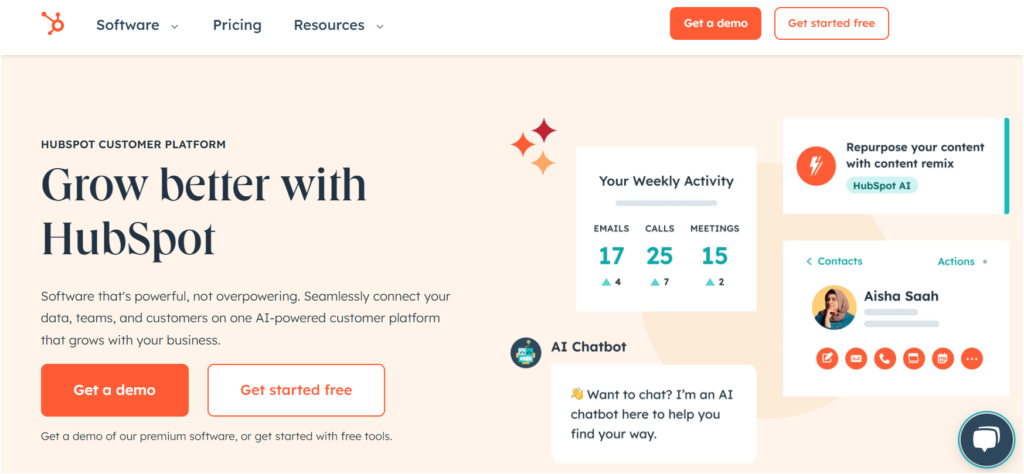
HubSpot is not only a widely acclaimed tool for startups but also a preferred choice for established enterprises like IBM, SurveyMonkey, and Trello. Its versatility extends beyond small businesses, empowering industry giants to streamline their marketing, sales, and customer service operations.
This robust platform facilitates seamless management of customer relationships, marketing campaigns, and sales pipelines. With features like CRM integration, email marketing, and lead scoring, HubSpot offers a comprehensive solution for businesses aiming to drive customer engagement and accelerate growth.
Features:
a) Centralized customer data and interactions for enhanced relationship management.
b) Automate marketing workflows, lead nurturing, and personalized messaging.
c) Streamline sales processes, track deals, and analyze performance metrics.
d) Deliver exceptional customer service with ticketing, a knowledge base, and customer feedback tools.
e) Gain actionable insights through real-time reporting and performance analytics.
HubSpot's intuitive interface, extensive feature set, and scalability make it an indispensable asset for startups and enterprises alike, empowering them to achieve their marketing and sales objectives efficiently.
8. Salesforce
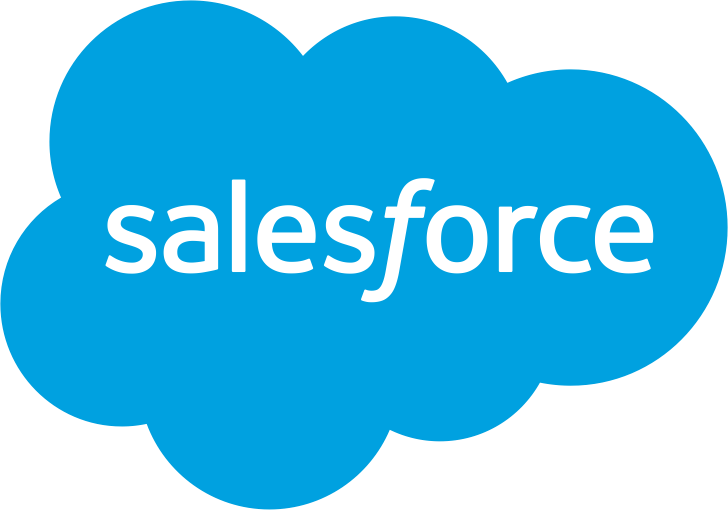
Salesforce isn't just a tool for startups—it's a comprehensive platform trusted by leading companies worldwide, including Spotify, AWS, and Toyota. Its robust suite of CRM solutions empowers businesses of all sizes to build stronger customer relationships and drive growth.
Salesforce provides a centralized hub for managing customer data, interactions, and sales pipelines. Its customizable features and scalability make it adaptable to the unique needs of startups as well as large enterprises.
Features:
a) Centralizes customer information, interactions, and sales activities for improved relationship management.
b) Streamline sales processes, track leads, and manage opportunities to drive revenue growth.
c) Deliver exceptional customer service with case management, self-service portals, and AI-powered support.
d) Create personalized marketing campaigns, track customer engagement, and analyze campaign performance.
e) Gain actionable insights into sales, marketing, and customer service metrics through powerful analytics and reporting tools.
For Financial Management & Accounting
9. QuickBooks
QuickBooks is a trusted financial management solution used by businesses of all sizes, including established enterprises like Lyft, Airbnb, and Shopify. Its user-friendly interface and powerful features make it a go-to choice for managing finances, invoicing, and accounting tasks efficiently.
Hosting QuickBooks on cloud enhances accessibility and collaboration, allowing businesses to leverage its robust features like expense tracking, invoicing, and payroll processing from anywhere.
Simplifies financial management by offering features such as expense tracking, invoicing, and payroll processing. Its customizable reports and real-time insights empower businesses to make informed financial decisions and stay compliant with tax regulations.
Features:
a) Easily tracks business expenses and categorizes transactions for accurate record-keeping.
b) Create professional invoices, send payment reminders, and accept online payments to get paid faster.
c) Streamline payroll processing, calculate sales tax, manage employee benefits, and stay compliant with payroll taxes.
d) Generate customizable reports to gain insights into business performance, cash flow, and profitability.
e) Seamlessly integrate with third-party apps and services to extend functionality and improve productivity.
10. Xero
Xero stands out as a pivotal asset not just for startups but for businesses of all scales, spanning from burgeoning ventures to established enterprises. Renowned for its cloud-based accounting prowess, Xero offers an intuitive interface coupled with a rich array of features tailored to manage finances, invoicing, and collaboration seamlessly. You can even save significantly by applying a Xero discount, like up to 90% off for six months, or nonprofit pricing
Xero simplifies the intricacies of accounting with functions like bank reconciliation, invoicing, and expense tracking. Its real-time insights and customizable reporting capabilities empower businesses to make informed financial decisions and maintain a firm grip on their cash flow dynamics.
Features:
a) Effortlessly import and categorize bank transactions, facilitating swift and accurate reconciliation of accounts.
b) Craft professional invoices, tailor templates to suit brand aesthetics, and deploy automated payment reminders to streamline transactions.
c) Capture and categorize expenses on-the-go, streamline receipt management, and bolster organizational efficiency.
d) Harness the power of customizable reports to glean insights into business performance, cash flow trends, and profitability metrics.
e) Foster seamless collaboration among stakeholders, including accountants, bookkeepers, and team members, by securely sharing financial data and insights in real-time.
11. Eqvista
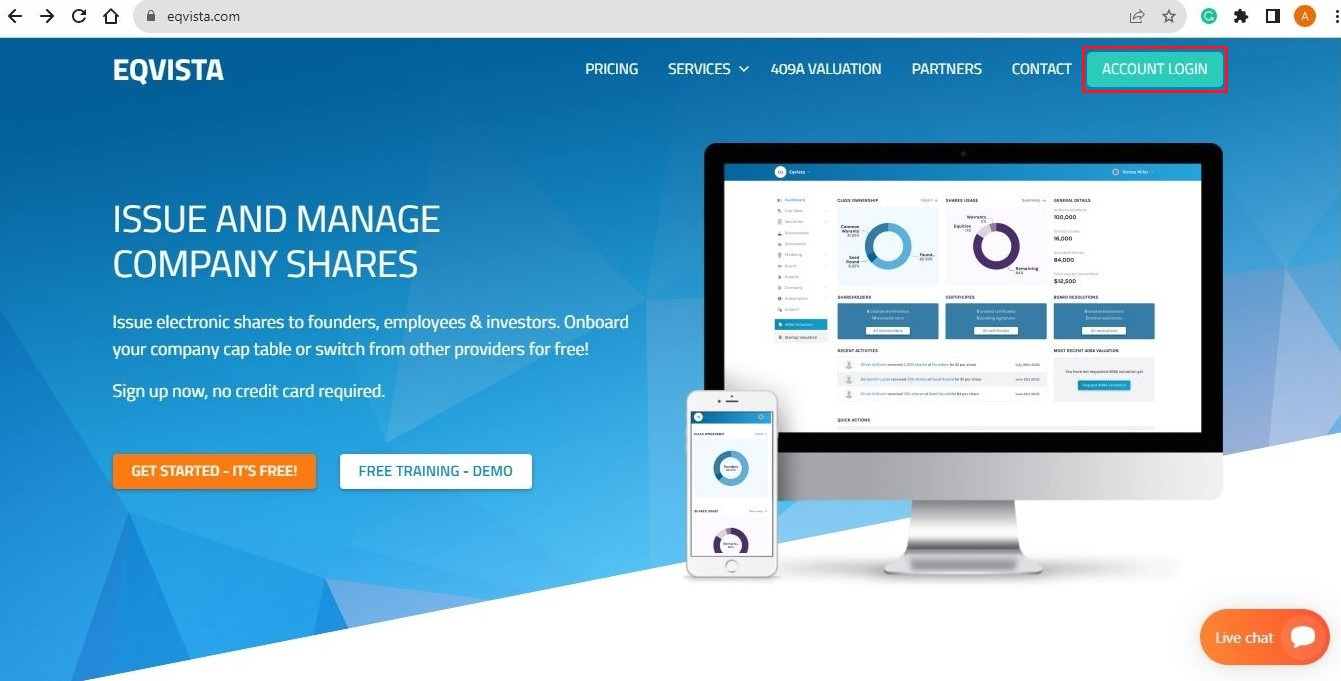
Eqvista is an advanced, all-encompassing equity management platform tailored for startups, growing businesses, and enterprises of any size. This makes the complicated process of tracking cap tables, shareholder equity management, issuing and transferring shares, and 409A valuations into one single seamless platform, thus simplifying the equity management with visual insights on funding rounds, ownership structures, and equity distribution, thereby aiding businesses in strategic decisions through data-driven processes.
Beyond compliance and operational efficiency, Eqvista empowers business owners and financial teams with flexibility in scaling up their operations, without getting tied up in lengthy administrative work. It automates most of the equity management to help users stay focused on growth, fundraising, and overall strategy, with high precision and confidence in equity-related decisions.
Features:
a. Cap Table Management Software: Eqvista is one of the top solutions for cap table management. It provides startups and businesses with a centralized platform to track shareholder equity and manage complex ownership structures.
b. 409A Valuations: Eqvista provides unlimited access to 409A valuations, helping companies ensure IRS compliance when issuing stock options and eliminating the risk of misvaluing stock grants.
c. Electronic Share Issuance: Through Eqvista, businesses can issue their shares and facilitate electronic acceptance of equity grants by shareholders, thus removing the burden of paper certificates and increasing operational efficiency.
d. Advanced Financial Analysis Tools: This platform has some advanced tools meant to analyze company financials, supporting better decisions and strategic planning based on a clear picture of the firm's health at a particular level.
e. Detailed Reporting: Eqvista delivers companies detailed reports and analyses about ownership changes, dilution effects, and other important metrics to provide a company with a comprehensive view of how its equity is changing over time.
For Development & Design
12. Coupler.io
A modern reporting automation platform built for marketing, sales, and finance teams overwhelmed by fragmented data and manual reporting. Coupler.io helps turn complex, multi-source data into clear, actionable insights, no coding required.
Originally born out of a costly invoicing mistake, Coupler.io now empowers over 1M users to make faster, data-driven decisions with live dashboards. Whether you’re building a custom sales report or starting from an accounting dashboard template for financial analysis, Coupler.io gives you the tools to automate data flows.
Coupler.io replaces repetitive copy-paste routines with powerful automation. It blends data from over 800 apps into spreadsheets, dashboards, and BI tools.
Features:
a) Automate data sync from 800+ apps (Google Analytics, HubSpot, Facebook Ads, Xero, etc.) to Google Sheets, Excel, BigQuery, and more.
b) Blend, transform, and clean your data in-app without SQL or Python. Aggregate metrics, join sources, and preview live outputs.
c) Schedule automatic refreshes as frequently as every 15 minutes to keep reports and dashboards up to date.
d) Use 100+ ready-made dashboard templates for marketing, sales, and finance, or build custom ones to fit your KPIs.
e) Share dashboards with clients and stakeholders in real time, or use built-in visualizations to skip third-party BI tools altogether.
13. GitHub
GitHub is a web-based platform revolutionizing software development with its comprehensive suite of tools. a distributed version control system, enabling precise tracking of code changes. Developers utilize GitHub for hosting code repositories, facilitating collaboration on projects of any scale, be it personal, open-source, or enterprise. With a GitHub deal, teams can access premium features at a discounted rate, enhancing their development workflow and project management capabilities.
Its features include issue tracking, pull requests for code review, and project management tools, fostering efficient teamwork. GitHub's vibrant community encourages collaboration and knowledge sharing through forking, contributions, and discussions.
With seamless integration capabilities, it automates workflows, ensuring smooth testing, deployment, and continuous integration. GitHub stands as a cornerstone of modern software development, empowering teams worldwide.
Features:
a) Utilize Git to track changes, manage branches, and collaborate on code development with ease.
b) Facilitate seamless collaboration among developers through pull requests, code reviews, and discussions.
c) Streamline bug tracking and project management by creating, assigning, and prioritizing issues within repositories.
d) Integrate with CI/CD tools to automate build and deployment processes, ensuring code quality and reliability.
e) Tap into a vast ecosystem of open-source projects, libraries, and resources, fostering innovation and knowledge sharing.
14. Canva
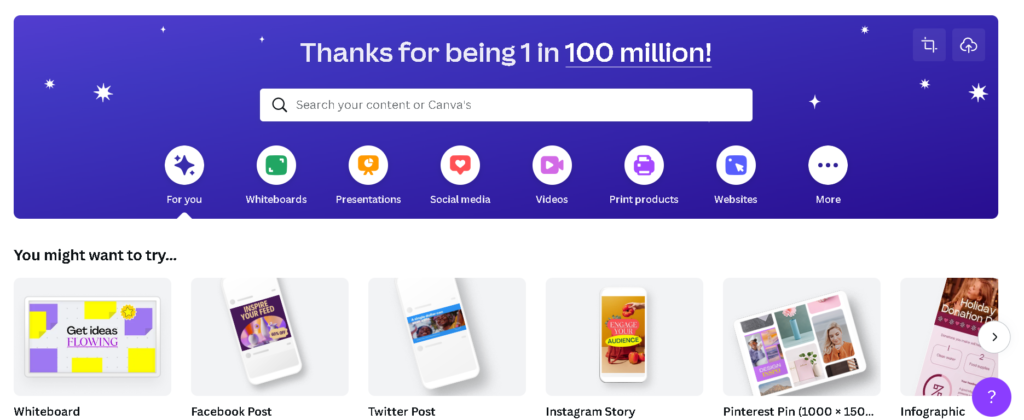
Canva is a creative sanctuary for startups and businesses alike. With its intuitive interface and plethora of design options, Canva transforms mundane tasks into opportunities for artistic expression. Canva offers a myriad of features designed to unleash creativity.
From customizable templates to an extensive library of graphics and fonts, it provides the building blocks for visually stunning designs. Moreover, its collaborative capabilities enable teams to ideate and iterate seamlessly, fostering a culture of innovation.
Features:
a) Choose from a diverse range of templates tailored to various purposes, from social media posts to business presentations.
b) Personalize designs with ease using Canva's intuitive editing tools, allowing for unique color schemes, typography, and layouts.
c) Facilitate teamwork by inviting colleagues to collaborate on designs in real-time, fostering creativity and camaraderie.
d) Maintain brand integrity with Canva Brand Kit, where logos, colors, and fonts are stored for easy access across all designs.
e) Share designs effortlessly on social media platforms or download them in multiple formats for offline use or printing.
15. DesignWiz
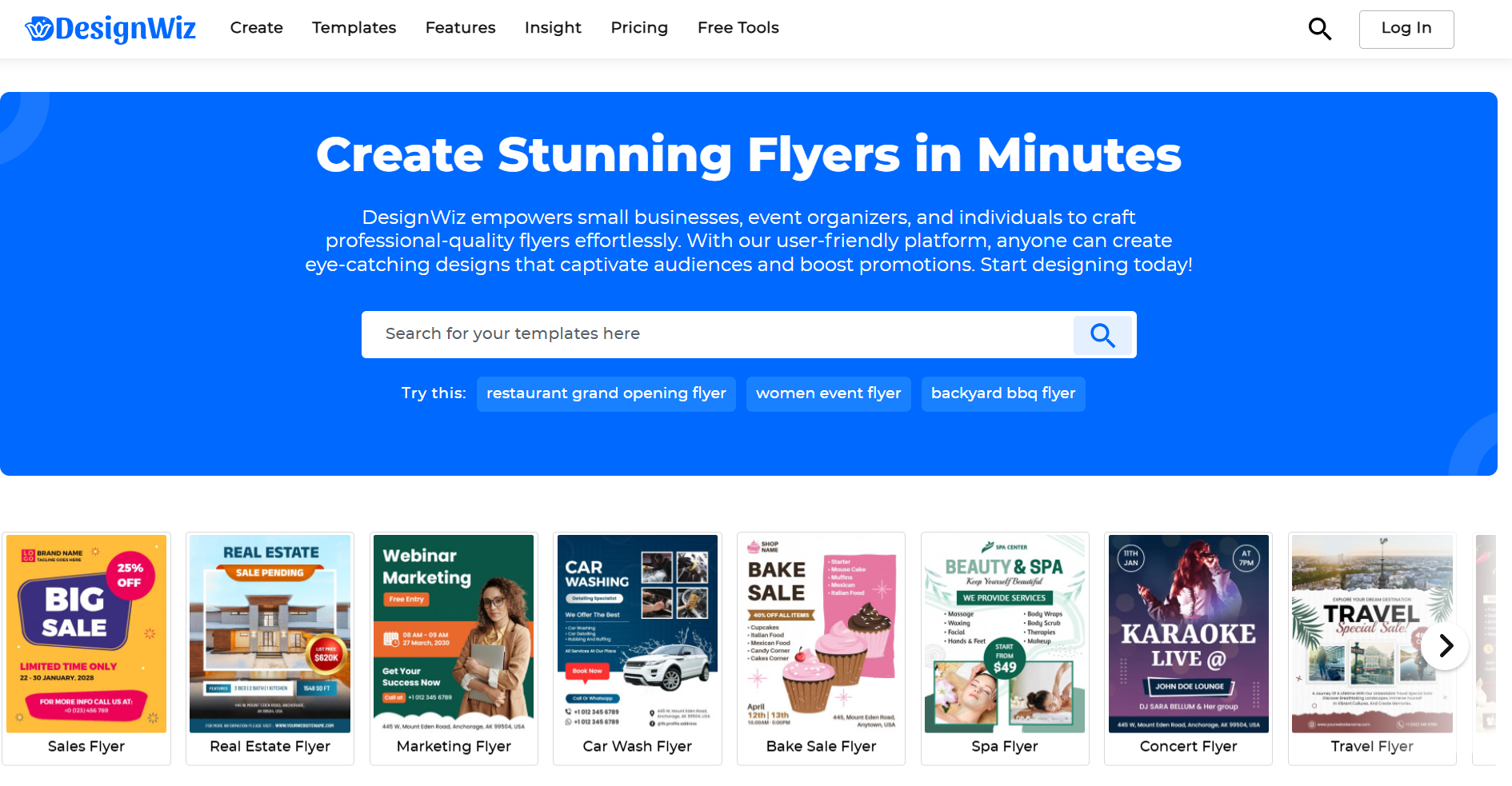
DesignWiz is a dedicated platform for small businesses, event organizers, and individuals looking to create stunning flyers effortlessly. With its intuitive interface and specialized features, DesignWiz transforms flyer creation into a seamless and enjoyable process.
DesignWiz offers a wide array of tools to help users craft professional designs without requiring any prior experience. Whether it’s for a special promotion, event, or brand enhancement, DesignWiz has the resources to bring your vision to life.
Features:
a) Explore a rich library of flyer templates tailored for various occasions, including events, promotions, and brand advertisements.
b) Personalize flyers with powerful yet easy-to-use tools, enabling custom layouts, colors, fonts, and graphics to suit your unique style.
c) Save time with DesignWiz's intuitive drag-and-drop editor, simplifying the design process for users of all skill levels.
d) Maintain brand consistency with features that allow you to save and reuse your brand’s logos, colors, and fonts.
e) Share your creations with ease by downloading in multiple formats (PDF, PNG, JPEG).
16. Venngage
Venngage is a powerful platform dedicated to creating stunning infographics and data visualizations. Whether you are a startup looking to make a mark or a business aiming to present data in a compelling way, Venngage offers an array of tools designed to transform raw information into visually engaging content. With its user-friendly interface and robust feature set, Venngage turns the complex task of data representation into an opportunity for creativity and clarity. Additionally, Venngage includes tools to ensure accessibility, making it easier for all users to engage with your content.
Features:
a) Choose from a vast selection of templates tailored for various data presentation needs, including statistical infographics, informational charts, and process visuals.
b) Easily personalize infographics with Venngage's intuitive drag-and-drop editor, allowing users to adjust colors, fonts, icons, and layouts to match their brand’s aesthetic and message.
c) Import data directly from spreadsheets or connect to live data sources, ensuring your infographics are always up-to-date and accurate.
d) Enhance teamwork by inviting colleagues to work on infographics in real-time, making it easy to brainstorm, share ideas, and finalize designs collaboratively.
e) Utilize features designed to improve accessibility, such as alt text for images and data visualization, ensuring your infographics are accessible to a wider audience, including those with disabilities.
17. Sivi AI
Unlike template-based design tools, Sivi enables startups to generate unique, template-free designs in a minute or two. With gen AI at the core, it creates designs based on the provided content and brand preferences. With Sivi AI design generator, turn your ideas into stunning display ads, social posts, YouTube thumbnails, and more in 72+ languages, tailored to your brand.
Features:
a) Turn prompts into designs, in minutes – Enter a brief prompt with display ad details, and Sivi generates ad copy, images, and professional-quality banners within minutes.
b) Generate on-brand banners effortlessly – Maintain brand consistency by customizing designs with preferred colors, fonts, and button styles.
c) Transform copy to template-free creatives – Add custom ad copy such as title, icon, date, and CTA, and generate unique designs tailored to your messaging.
d) Edit design as you wish - Adjust the elements, tweak the text, or change the colors to fine-tune the designs to your requirements.
e) Share the designs, as you like - Download the designs in multiple formats including JPG, PNG, HTML, and more, or directly share them via link.
For Marketing & Social Media Management
18. Mailchimp
Mailchimp is a dynamic marketing platform that caters to businesses across the spectrum, from budding ventures to established enterprises like TED and SoulCycle. Its reputation for simplicity and effectiveness has made it a go-to choice for businesses worldwide.
Mailchimp offers a robust suite of marketing tools designed to streamline every aspect of campaign management. From crafting engaging emails with its drag-and-drop editor to analyzing campaign performance with detailed analytics, Mailchimp empowers users to create impactful marketing strategies that drive results.
Features:
a) Craft visually stunning emails with ease using Mailchimp's customizable templates and intuitive editor.
b) Dive deep into subscriber data to segment audiences based on behavior, preferences, and demographics for targeted campaigns.
c) Automate workflows, from welcome emails to post-purchase follow-ups, to nurture leads and boost conversions.
d) Gain valuable insights into campaign performance with real-time analytics, A/B testing, and audience engagement metrics.
e) Integrate Mailchimp with your favorite tools and platforms to streamline workflows and enhance productivity.
19. Buffer
Buffer is a game-changer in social media management, trusted by businesses of all sizes, from emerging startups to global brands like Shopify and Trello. Renowned for its simplicity and effectiveness, Buffer empowers users to plan, schedule, and analyze social media content with ease.
Buffer offers a suite of tools designed to streamline social media management and amplify online presence. Its intuitive dashboard, scheduling features, and analytics capabilities make it a go-to platform for businesses looking to optimize their social media strategy and engage with their audience effectively.
Features:
a) Plan and schedule posts across multiple social media platforms, including Facebook, Twitter, LinkedIn, and Instagram.
b) Visualize your content schedule and plan ahead with Buffer's easy-to-use content calendar.
c) Track key metrics such as engagement, reach, and clicks to measure the performance of your social media campaigns.
d) Team Collaboration: Collaborate with team members by assigning roles and permissions, and streamline communication with comments and feedback.
e) Seamlessly integrate with other tools and platforms, such as Canva and Google Analytics, to enhance productivity and streamline workflows.
For Analytics & Data
20. Google Analytics
Cornerstone of digital marketing strategy embraced by businesses of all sizes, from local entrepreneurs to global corporations like Coca-Cola and Nike.
Renowned for its robust features and actionable insights, Google Analytics empowers users to track, analyze, and optimize website performance with precision.
Google Analytics offers a comprehensive suite of tools designed to monitor website traffic, user behavior, and conversion metrics. Its intuitive dashboard, customizable reports, and real-time data make it a go-to platform for businesses looking to understand their audience and make data-driven decisions.
Features:
a) Monitor website traffic in real-time and gain insights into user demographics, interests, and behavior.
b) Track key conversion metrics such as goal completions, e-commerce transactions, and lead generation forms.
c) Segment website visitors based on various attributes such as location, device, and referral source for targeted analysis.
d) Create customizable reports tailored to your business goals and KPIs, allowing for deeper insights and analysis.
e) Seamlessly integrate Google Analytics with other Google products and third-party tools to enhance functionality and streamline workflows.
21. Coupler.io
A modern reporting automation platform built for marketing, sales, and finance teams overwhelmed by fragmented data and manual reporting. Coupler.io helps turn complex, multi-source data into clear, actionable insights, no coding required.
Originally born out of a costly invoicing mistake, Coupler.io now empowers over 1M users to make faster, data-driven decisions with live dashboards. Whether you’re building a custom sales report or starting from an accounting dashboard template for financial analysis, Coupler.io gives you the tools to automate data flows.
Coupler.io replaces repetitive copy-paste routines with powerful automation. It blends data from over 800 apps into spreadsheets, dashboards, and BI tools.
Features:
a) Automate data sync from 800+ apps (Google Analytics, HubSpot, Facebook Ads, Xero, etc.) to Google Sheets, Excel, BigQuery, and more.
b) Blend, transform, and clean your data in-app without SQL or Python. Aggregate metrics, join sources, and preview live outputs.
c) Schedule automatic refreshes as frequently as every 15 minutes to keep reports and dashboards up to date.
d) Use 100+ ready-made dashboard templates for marketing, sales, and finance, or build custom ones to fit your KPIs.
e) Share dashboards with clients and stakeholders in real time, or use built-in visualizations to skip third-party BI tools altogether.
For Customer Support
22. LiveHelpNow
LiveHelpNow, founded by entrepreneur Michael Kansky in 2005, revolutionizes customer service with its comprehensive, enterprise-level live chat software.
Initially a free tool, it evolved into a robust solution by 2009, offering omnichannel support including ticket management, knowledge base, text/SMS messaging, chatbots, and callback software.
Today, with over 22,000 users across 30,000+ websites, LiveHelpNow enhances efficiency for customer service agents and responsiveness for businesses.
Features:
a) Engage with customers via web chat, SMS, Facebook Messenger, and more, with a unified communication history for your team.
b) Improve the accuracy and speed of customer support with AI-generated answers powered by your data.
c) Integrate CRM and marketing platforms for fast, accurate service with all customer data in one place.
d) Insights and Analytics: Monitor agent performance and customer behavior with detailed reports and dashboards.
e) Organize interactions and identify trends with automatic message categorization.
23. Zendesk
Zendesk is a leading customer service platform trusted by businesses worldwide, from emerging startups to Fortune 500 companies like Airbnb and Uber.
Renowned for its simplicity and effectiveness, Zendesk empowers businesses to deliver exceptional customer support across multiple channels.Its intuitive interface, customizable workflows, and automation features make it a go-to platform for businesses looking to elevate their customer service experience.
Features:
a) Centralize customer inquiries, support tickets, and requests in one unified platform for efficient handling.
b) Engage with customers across various channels, including email, chat, phone, and social media, from a single interface.
c) Create a self-service knowledge base with FAQs, tutorials, and articles to empower customers and reduce support volume.
d) Automate repetitive tasks, such as ticket routing and responses, to streamline support workflows and improve efficiency.
e) Reporting and Analytics: Track key support metrics, measure agent performance, and gain insights into customer satisfaction levels to drive continuous improvement.
For Web Hosting
24. Liquid Web
Startups need web hosting providers like Liquid Web for several critical reasons to support their growth and operations. This includes increasing your online presence through a website, reliable server uptime, and security features such as VPS security, SSL certificates, regular backups, and more.
Liquid Web provides customers with an unrivaled hosting experience, delivering 99.999% uptime & 24/7 access to customer service. Plus, VPS hosting is often the go-to choice for startups as a budget-friendly option.
Features:
a) Dedicated servers with customizable dedicated infrastructure to fit your needs as a startup.
b) Cloud VPS that can be scaled up or down to meet your needs during business launches, holidays, or promotions.
c) Service clusters for maximum uptime and performance.
d) Private VPS parent for deploying VPS instances.
Conclusion
Choosing the appropriate equipment is similar to building a robust base for a tall building. Every piece of equipment acts as a support column that upholds the main framework of the company, aiding in its steadiness and expansion.
Thus, new companies need to make this choice thoughtfully, considering aspects like performance, user-friendliness, affordability, and how well it works with current systems.
By dedicating effort and resources to finding and using the most suitable equipment for their unique requirements, new companies can create a strong base for achievement, enabling their teams to create, work together, and grow effectively.




